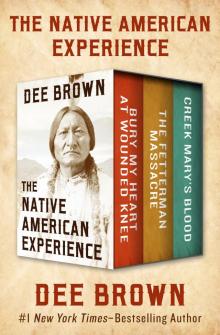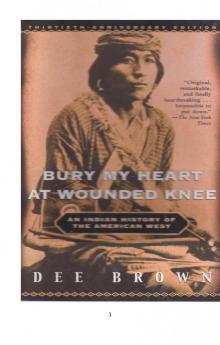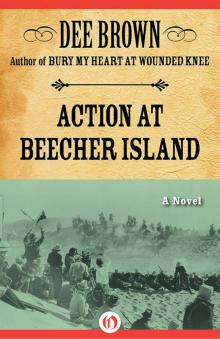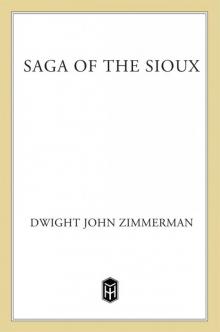Action at Beecher Island: A Novel Read online
Page 17
The scouts were held together by something stronger than mere military discipline, Forsyth thought … but it all seemed so long ago … there was dried horsemeat then but now there was nothing but the stench of rotting animals … the Indians were gone … he must order the men who were able to walk to make a try at saving themselves … some of them were beginning to turn crazy, sometimes refusing to talk and sometimes talking like lunatics.
He could hear Burke talking now, in the adjoining sand pit. “Wake up, Oakes, the Indians are gone. You’d better walk around a bit to keep your arrow wound open so it’ll heal from the inside. If it closes up outside you’ll have a bad time, for certain.”
George Oakes grumbled profanely about being waked out of the only pleasant dream he’d had on the island. “I was dreaming I had this nice piece of buffalo hump and was just opening my watering mouth to chew down on it when you had to go and wake me up, Burke.”
“Look over there!” The Irishman’s voice was suddenly filled with excitement. “Must be somebody coming.”
“More Indians,” Oakes said disgustedly. From across the defense circle a scout shouted: “Indians coming back!”
Forsyth pulled himself upright. Several men were out of their pits, staring toward the low line of hills beyond the grass flats. “Some of our boys are out there hunting for game!” another scout cried. “We’d better organize a rescue party.”
“Hold on a minute!” The voice was Sharp Grover’s. He dropped into Forsyth’s pit, and picked up the major’s field glass. “There are some moving objects on the far hills, Major.” After a moment he dropped the glass back on the canvas. His usually tight lips were relaxed in a faint smile.
“Are they Indians?” Oakes shouted.
“They don’t ride like Indians,” Grover answered. “Boys, there comes our relief!”
“Are you certain?” Forsyth asked.
“They’re wearing blue, Major, and coming in fast.”
The scouts were already swinging their hats and cheering. Like a whirling jumping-jack, Schlesinger circled the pits in a lunatic’s dance, laughing until tears came into his eyes. Dick Gantt, although badly wounded, was using his carbine as a crutch and jigging on one leg; he joined hands with Schlesinger and almost fell, laughing wildly.
With his field glass Forsyth found the lead horseman. “By all the wonders,” he said. “It’s Louis Carpenter and his Brunettes!” Morning sunshine glittered on the cavalrymen’s sabers and carbines; wind whipped their single guidon.
“They’re buffalo soldiers, all right,” Grover agreed. “I can see their white teeth grinning at us from their black faces. And, Major, if you’ll take a look down the valley you’ll see more of them, bringing in an ambulance.”
“Glory be!” Forsyth’s voice broke under the strain. “Carpenter thought of everything. An ambulance means that a surgeon must be with them.”
“I’ll mosey down and meet him,” Grover said. “No one on this island needs a doc more than you do, Major.”
Forsyth was having trouble keeping moisture out of his eyes. He watched Carpenter coming on in that familiar easy lope he’d favored when they were riding together in the Shenandoah. They’d always been friendly rivals, trying to outdo each other in imperturbability, composure under stress. Carpenter always called it sangfroid. Well, he’d show Carpenter some sangfroid now. He reached under the canvas stretcher, found his dog-eared copy of Dickens’ Oliver Twist, turned his back to the approaching cavalrymen and pretended to be reading.
He could hear the hoofbeats on the sand. Most of the riders halted outside the defense circle but one came on slowly to Forsyth’s pit. The tired horse snuffled, saddle leather creaked, boots scrunched against sand. Forsyth carefully folded the corner of a page in his book, closed it, turned slowly and looked up at Louis Carpenter. “Captain Carpenter,” he said, “you’re late in reporting.”
Carpenter opened his mouth, started to laugh, but could not conceal his concern over Forsyth’s weakened appearance. “Don’t try to pull rank on me, Sandy Forsyth,” he growled. He rubbed a forefinger across his bleached mustache, frowning at the devastated island, and then jerked a bandanna from his pocket and buried his nose in it against the stench of decaying animals. “You keep a might malodorous camp, Major Forsyth. Would never pass inspection.” He knelt beside the canvas stretcher, removed a gauntlet, and offered his hand. “How are you, you old rawhider?”
A few minutes later the ambulance rolled onto the island, and Grover and the surgeon joined them. “This is Dr. Jenkins Fitzgerald, Major Forsyth,” Carpenter said. “He’ll soon have you back in a saddle.”
Forsyth showed Dr. Fitzgerald where his two wounds were, and while the surgeon unwrapped the dirty bandages for closer examination, he tried to keep his mind off the pain by watching the scouts’ noisy reception of the troopers.
In front of his pit, Negro cavalrymen were emptying their haversacks of rations, distributing them among the scouts. One huge trooper lent his arm to crippled Dick Gantt who was saying: “When you boys rode over that slope, it was the prettiest sight I ever did see.”
The Negro smiled and looked closely at Gantt. “From your talk, I reckon you must be a Southern boy?”
“Mississippi,” Gantt replied.
“Me, too. What you doing here with all these Yankees?”
Gantt stopped chewing on his mouthful of bacon. “You know, I been asking myself that question for the last nine days.”
Dr. Fitzgerald stood up to ease the strain on his back. He glanced at the group of scouts and troopers. “Captain Carpenter,” he said, “if you don’t want a pack of sick scouts on your hands and mine, you’d better order your troopers to stop stuffing them. Nothing will give a starving man stomach cramps quicker than hardtack and raw bacon.”
Carpenter immediately shouted an order to a sergeant to stop his men from distributing food.
“Another thing we must do right now,” the surgeon continued, “is move off this reeking island.”
Forsyth suggested that the high ground to the east would be the best vantage point for a new camp, and in a few minutes the transfer was under way. Using stretchers from the ambulance, troopers carried the sick and wounded across the riverbed and then for a quarter of a mile up the slope. Before the task was completed, Lieutenant Banzhaf’s wagon train arrived, tents were unloaded, and a makeshift field hospital hastily established. Under the busy surgeon’s direction a detail of troopers also began preparing hot bacon soup and coffee for the famished scouts.
After swallowing some of the soup, Forsyth fell asleep under an open tent shelter, and it was late afternoon when he awoke again to find Dr. Fitzgerald sitting on a camp stool beside him. “Major,” the surgeon said, “I’m going to be direct with you. Your fever is worse, indicating what I suspected when I examined you this morning. Your shattered leg is filled with poison.”
“Yes?”
“I must advise amputation.”
Forsyth gripped the edges of his cot with his hands. “Suppose I say no?”
“I can’t force you to a decision. Amputation is dangerous in a hospital, doubly dangerous out here, but the poison is spreading.”
“What are my chances if I say no?”
Fitzgerald shrugged. “Perhaps fifty-fifty. But if your condition worsens for another twenty-four hours, undoubtedly it will be too late to amputate.”
For several seconds Forsyth stared at his bandaged leg; then he said firmly: “I refuse permission to amputate.”
Fitzgerald sighed. “Then I must drain your leg, set your shattered bones, and try to clean out the poisoned lacerations with carbolic acid. The pain will be excruciating. You must be given chloroform of course.”
Hours later Forsyth was dreaming that he was in a deep cave. He was struggling to reach the entrance which seemed to be whirling and growing narrower. Calm voices sounded from nearby, and only by the greatest effort of will was he able to raise his eyelids.
“You’re doing splendidly, Major,�
� Fitzgerald said. He lifted Forsyth’s shoulders while a trooper placed a folded blanket beneath so that he could sit partially erect. “You may feel nauseous after a few minutes,” the surgeon continued. “If so, just let go.”
As his vision cleared, Forsyth was surprised at the enormity of his left leg. “You must have used barrel staves for splits,” he said.
“Used the trunk of a cottonwood tree,” Fitzgerald replied. “Halved it, hollowed it, and packed it with cotton. After all the labor I spent putting your shattered shinbone back together, I don’t mean for it to be shaken loose on the way back to Fort Wallace.”
Forsyth noticed a small detail of men at work on the slope below. He had seen enough such details to know what they were doing; they were burying the dead. A trooper was driving stakes into the ground at the head of each grave. Just behind the trooper, Sergeant McCall was hammering an empty cartridge into each stake. In his thorough way, McCall had written the name of each dead scout on a piece of paper and rolled it into an empty cartridge for later identification.
“Beecher, Mooers, Culver, Wilson,” Forsyth said softly. “But I count five graves. Who was the fifth man?”
“Farley. The older one, Lewis Farley. If we could have arrived a day or two earlier I might have saved him, but his arm was gangrenous, too near the heart. His boy takes it hard.”
“Yes, I remember. Farley lost his wife in an Indian raid.” Forsyth gazed at a graying bank of clouds in the west. The sun was already down. “How are the other wounded scouts?”
“They’re tough as oaks; they’ll make it.” Fitzgerald turned at the sound of approaching footsteps. In the first dull light of dusk, Forsyth recognized the sturdy silhouette of Louis Carpenter striding up the slope. He was carrying a pair of boots slung over his shoulder.
Carpenter’s voice rasped at the surgeon: “How is he?”
“He’ll do,” Fitzgerald replied.
Another and much thinner silhouette appeared behind Carpenter. “The scouts want to know how the major is.” It was Schlesinger’s voice.
“Tell them I still have my leg in spite of the surgeon,” Forsyth said.
“Can I bring you anything, sir?”
“Not a thing, Slinger, thank you.”
Carpenter dropped the boots he was carrying beside Forsyth’s cot. “Sergeant McCall said you should have them. They were Lieutenant Beecher’s.”
“Fred Beecher. The finest young officer I ever knew.” Forsyth blinked at the darkening sky. “Beecher never liked boots. Preferred Indian moccasins.” He turned his head and was surprised to see Schlesinger still standing there, watching anxiously. The boy’s cheap shoes were cracked and broken. “Slinger, take these boots. Lieutenant Beecher would want you to have them.”
“Thank you, sir. It’s an honor.”
“If they fit, wear them.”
“Yes, sir.”
Forsyth closed his eyes, fighting nausea. He could smell smoke from the evening’s first cooking fires, scented with cedar. Faintly, then more strongly came the sound of singing voices, the troopers singing a mournful song. He remembered Virginia, the cedar smoke of campfires in the Shenandoah, and resonant Negro voices singing sadly out of the darkness.
Fitzgerald’s hand touched his forehead. “Your fever is down,” the surgeon said.
“They don’t make them any flintier than Major Forsyth,” Carpenter declared. “By the way, Sandy,” he added, “I’ve started writing my report, but I don’t know how to head it. What do they call this place, that island down there?”
Forsyth stared hard at the captain. “I don’t know how the Indians or the map makers name it,” he said slowly. “But forever in my memory it will be Beecher’s Island.”
A Biography of Dee Brown
Dorris Alexander “Dee” Brown (1908–2002) was the author of many fiction and nonfiction books about the American West and the Civil War. He is best remembered for his celebrated chronicle Bury My Heart at Wounded Knee, which is widely credited with exposing the systematic destruction of American Indian tribes to a world audience.
Born in Alberta, Louisiana, Brown grew up in the small town of Stephens in Ouachita County, Arkansas. His father died when he was five years old, and he was raised by his mother and maternal grandmother, who proved instrumental in igniting his interest in reading at an early age. His grandmother told him stories from the Civil War, as well as tales of Davy Crockett, the frontier hero who had been an acquaintance of her father’s. A regard for Pawnee baseball pitcher Moses Yellowhorse, as well as Brown’s friendship with an Indian peer, helped fuel his lifelong interest in the plight and history of American Indians.
As an adolescent, Brown was drawn to literature, particularly the works of John Dos Passos, William Faulkner, Jack London, and Robert Louis Stevenson. His interest in history was reinforced when a teacher introduced him to the expedition of Lewis and Clark. He was also drawn to journalism, and published his first story at the age of fifteen in a neighborhood tabloid he started with friends. Brown worked as both a reporter and a printer before enrolling at Arkansas State Teachers College (now the University of Central Arkansas), where he met his future wife, Sally Stroud. Brown later earned bachelor’s and master’s degrees in library science from George Washington University and the University of Illinois at Urbana-Champaign, respectively. In the years between these studies, during World War II, he was drafted to into the U.S. Army and served as a librarian in the Department of Agriculture, a position that gave him frequent access to the National Archives.
Brown began publishing magazine articles in the 1930s, followed by a novel in 1942. His writing career took off in 1948, with the publication of the first of three books of frontier history he had co-authored with Martin Schmitt, titled Fighting Indians of the West. Legendary Scribner’s editor Maxwell Perkins oversaw the series.
Brown went on to publish more than thirty books during his lifetime. His novels, which unite a love of storytelling and high adventure with rigorous historical accuracy, include Action at Beecher Island, Cavalry Scout, Conspiracy of Knaves, Killdeer Mountain, The Girl from Fort Wicked, and Creek Mary’s Blood, a notable saga about five generations of one American Indian family. Among his extensively researched works of nonfiction are The Gentle Tamers, about the role of women in the Old West; Hear That Lonesome Whistle Blow, a history of the beginnings of the railroads; and The Year of the Century: 1876, a look at America at the time of its first centennial. Brown’s most famous title is Bury My Heart at Wounded Knee (1970). During years of research, Brown compiled eyewitness accounts, tribal histories, and other archived documents, synthesizing them into a record of the deadly frontier conflicts in the late nineteenth century from an American Indian perspective. The book has been translated into more than thirty languages over the years, and continues to be translated for new audiences today. It remains one of the definitive works on American history, as it revealed a devastating side to western expansion.
Brown died in 2002 in Little Rock, Arkansas. He was ninety-four and at work on a new novel that was to be a sequel to The Way to Bright Star, which he published at the age of 90.
Infant Dee Brown with his half-siblings, Mildred and Daniel Brown, around 1908.
A young Brown in Arkansas, before 1920. (Photo courtesy of the Dee Brown LLC.)
Brown in the early 1920s. (Photo courtesy of the Dee Brown LLC.)
Brown’s college photo, taken in the 1920s.
Brown in the late 1920s in Wilson, Arkansas.
Brown with his mother, Lula Brown (left), and wife, Sally Stroud (right), in Washington, DC. in the 1930s.
A portrait of Brown taken during World War II.
Brown in the 1940s with his dog, Ivan, most likely taken in Maryland.
A studio shot of Brown from around 1950.
Brown with his grandson, Nicolas Wolfe, in 1972. He dedicated Bury My Heart at Wounded Knee to Nicolas. (Photo courtesy of Linda Luise Brown.)
Brown in the 1970s, in a photo taken by friend Rueben Thomas.
Brown in 1981, after the publication of Bury My Heart at Wounded Knee. (Photo courtesy of Linda Luise Brown.)
All rights reserved under International and Pan-American Copyright Conventions. By payment of the required fees, you have been granted the non-exclusive, non-transferable right to access and read the text of this ebook onscreen. No part of this text may be reproduced, transmitted, downloaded, decompiled, reverse engineered, or stored in or introduced into any information storage and retrieval system, in any form or by any means, whether electronic or mechanical, now known or hereinafter invented, without the express written permission of the publisher.
This is a work of fiction. Names, characters, places, and incidents either are the product of the author’s imagination or are used fictitiously. Any resemblance to actual persons, living or dead, businesses, companies, events, or locales is entirely coincidental.
copyright © 1967 by Dee Brown
cover design by Angela Goddard
978-1-4532-7424-8
This edition published in 2012 by Open Road Integrated Media
180 Varick Street
New York, NY 10014
www.openroadmedia.com
EBOOKS BY DEE BROWN
FROM OPEN ROAD MEDIA
Available wherever ebooks are sold

 The Native American Experience
The Native American Experience Bury My Heart At Wounded Knee
Bury My Heart At Wounded Knee Action at Beecher Island: A Novel
Action at Beecher Island: A Novel Saga of the Sioux
Saga of the Sioux